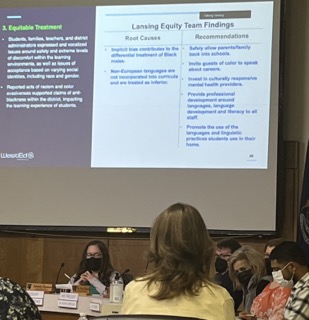The Lansing School District has created a new meaning of equity for its students, teachers and community.
Nearly two years ago, the district started an audit to determine what changes need to be made to make the school environment safer and to better center race, bias and power in the curriculum. In its Mar. 17 meeting, the board included a new definition of equity. “Equity is the removal of systemic barriers and creation of policies, practices and cultures that achieve fairness, justice and liberation for marginalized students, families, community members and educators in our educational system.”
Sarah Odneal, diversity, equity and inclusion director for the district, said she is excited to make the curriculum more reflective of the city.
The presentation brought out observations by students and staff. Some were that administrators of color expressed unequal treatment, more punishment issued to children of color, and race-based prejudices throughout.
The process started in June 2020, with a resolution passed to complete this process, said Treasurer Rachel Willis, who was a leading voice throughout this audit.
The audit was conducted in three phases: data collection, analysis and reporting, planning and strategy, and sustainability planning. The findings presented numerous equity issues for people of color within the district. Some are:

- Limited access to transportation
- Acts of implicit bias or race evasiveness
- Lack of equitable opportunities for gifted or honors courses
- Non-European languages deemed inferior and not incorporated into curriculum
- Limited technology
- Black girls are more likely to get a referral than white girls
- Black students are more likely to get suspended than white students
- Teachers are not being held accountable
- Teachers of color feeling pressured, or culturally taxed, to pick up the slack from white colleagues to teach about race.
“It’s time for Black cultural tax relief,” said equity team member Kristan Small. “I hope we go forward bravely.”
In response to findings that many students’ access to books is being limited because of library fines, President Gabrielle Lawrence made a motion to waive all library fees districtwide. This board unanimously supported this.
While there was disappointment in having district shortcomings laid out, the board expressed hope for the future.However, board members were also prepared for the challenges that lay ahead, such as white teacher resistance. Still, it was made clear that change is necessary for Lansing students.
This is just a start, said student support specialist Clarence Hassel after the meeting. He said the lack of resources at schools he works at affects the whole lives of the students, due to time lost to disruption and violence and lack of care from the district. “This is like life for our district,” he said.
The equity team and the board gave their own comments, questions and stories of how the lack of equity, access and resources have impacted the school environment.
Lansing teacher and equity team member Cathleen Weaver told a story about a fight that broke out in her school months ago. She said the office staff did nothing to prevent the first-grade students from hearing screams of pain and being confused about why it was happening. After that, she said the school did not want to have a conversation about the culture that caused this, nor the trauma it inflicted.
“When we are ignored, then why should we stay?” she concluded.
The board and equity team hope the findings will change the school environment. Small said, “I’m counting on it to start courageous conversations. To stop being race evasive, to center black voices, because it’s their kids, and their truth.”